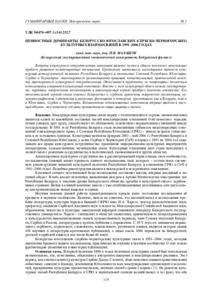Please use this identifier to cite or link to this item:
https://elib.psu.by/handle/123456789/1601Full metadata record
| DC Field | Value | Language |
|---|---|---|
| dc.contributor.author | Малашук, П. В. | - |
| dc.date.accessioned | 2014-03-25T06:58:27Z | - |
| dc.date.available | 2014-03-25T06:58:27Z | - |
| dc.date.issued | 2014 | - |
| dc.identifier.citation | Вестник Полоцкого государственного университета. Серия A, Гуманитарные науки: научно-теоретический журнал. – Новополоцк: ПГУ, 2014. - № 1. - С. 119-124. | ru_RU |
| dc.identifier.issn | 2070-1608 | - |
| dc.identifier.uri | https://elib.psu.by/handle/123456789/1601 | - |
| dc.description | P.V. Malashuk (Belorusskij Gosudarstvennyj Jekonomicheskij Universitet, Bobrujskij Filial). П.В. Малашук (Белорусский Государственный Экономический Университет, Бобруйский Филиал) | en |
| dc.description.abstract | Вопросы культурного сотрудничества занимают важное место в общем комплексе актуальных проблем развития международных отношений. Предметом настоящего исследования является культурный вектор внешней политики Республики Беларусь в отношении Союзной Республики Югославии, Сербии и Черногории. Анализируются организационно-правовой, концептуальный, практический аспекты двустороннего культурного сотрудничества. Отмечаются трудности, не позволившие полностью использовать имевшийся культурный потенциал. Вместе с тем культурный обмен между государствами, народами, творческими коллективами в анализируемый период приобрел заметное оживление. Его отличительной чертой стало участие белорусских и сербских артистов, творческих коллективов, кинематографистов, художников в различных фестивалях и конкурсах, проходивших как в Беларуси, так и в Югославии, Сербии и Черногории. Большинство использованных источников впервые введено в научный оборот, что позволило сделать принципиально новые выводы и оценки. = The problems of cultural cooperation play an important role in the program of international inter-relations. The article deals with foreign policy of the Republic of Belarus and the Union of Yugoslavia (Serbia – Montenagro). The organizational, legal, conceptual and practical aspects of bilateral cooperation are analysed. The article focuses attention on the problems which prevented the complete realization of the cultural potential. However, in the author’s opinion the cultural exchange in the described period became more animated The dis-tinguished features were activity of actors, creative groups, artists, cinematographers in festivals, competitions, concerts held both in Belarus and Yugoslavia, Serbia, Montenagro. The majority of the used information is taken from the reliable sources for the first time. It allowed to make fundamentally new conclusions and estimations. | ru_RU |
| dc.language.iso | ru | ru_RU |
| dc.publisher | Полоцкий государственный университет | ru_RU |
| dc.relation.ispartof | Веснік Полацкага дзяржаўнага ўніверсітэта. Серыя А, Гуманітарныя навук | be_BE |
| dc.relation.ispartof | Herald of Polotsk State University Series A, Humanity sciences | en_EN |
| dc.relation.ispartof | Вестник Полоцкого государственного университета. Серия A, Гуманитарные науки | ru_RU |
| dc.relation.ispartofseries | Серия A, Гуманитарные науки;2014.- № 1 | - |
| dc.rights | open access | ru_RU |
| dc.subject | Исторические науки | ru_RU |
| dc.subject | культурное отрудничество | ru_RU |
| dc.subject | фестивали | ru_RU |
| dc.subject.classification | УДК | ru_RU |
| dc.title | Ценностные доминанты белорусско-югославских (сербско-черногорских) культурных взаимосвязей в 1991–2006 годах | ru_RU |
| dc.type | Article | ru_RU |
| Appears in Collections: | 2014, № 1 | |
Files in This Item:
| File | Description | Size | Format | |
|---|---|---|---|---|
| 119-124.pdf | 223.05 kB | Adobe PDF |  View/Open |
Items in DSpace are protected by copyright, with all rights reserved, unless otherwise indicated.